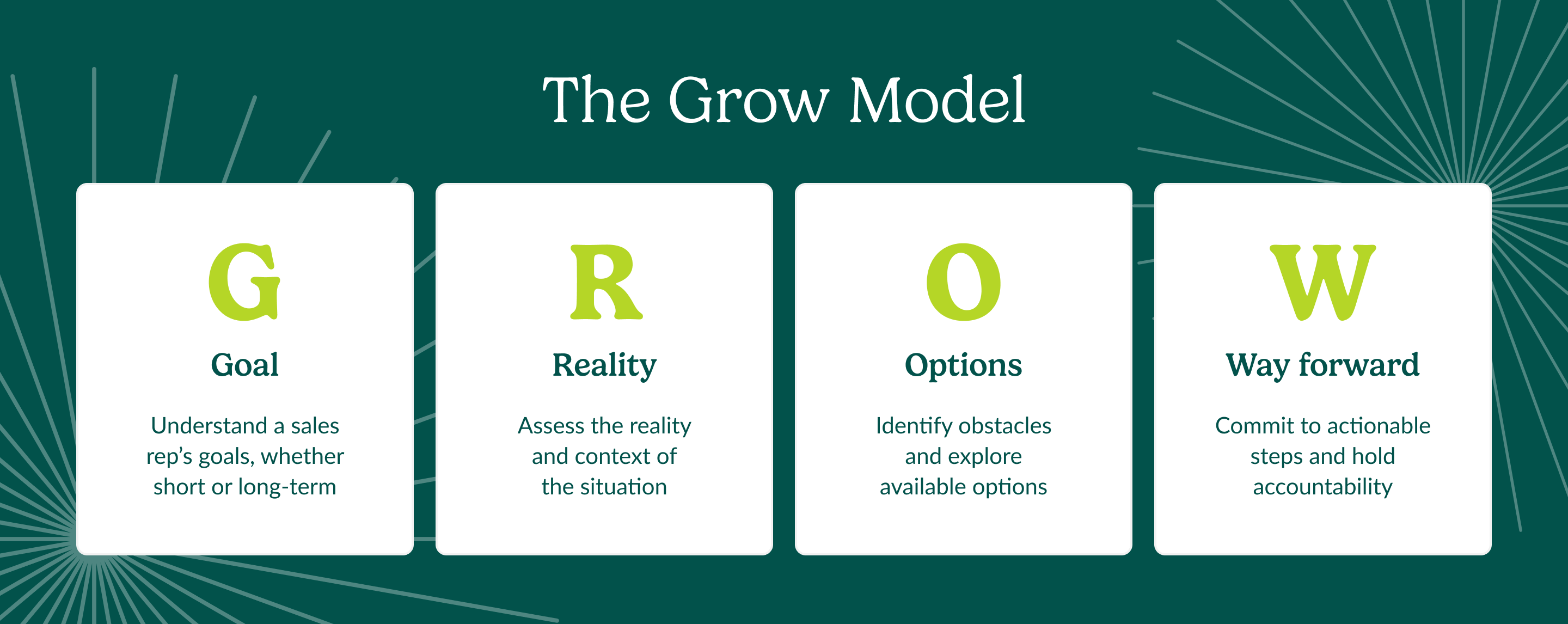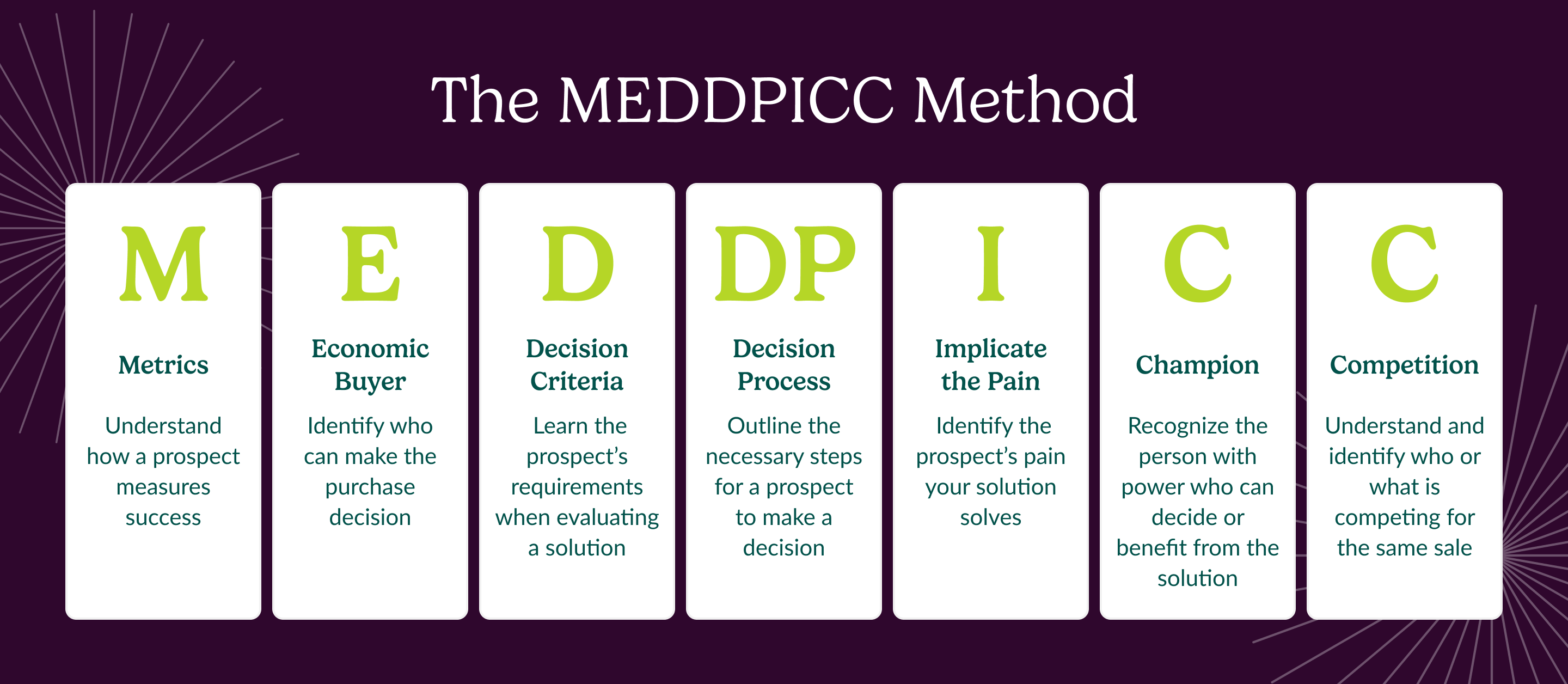The Guide to Sales Coaching
This guide provides a roadmap for building a successful sales coaching program, offering insights into the key benefits, essential elements, techniques, and best practices for impactful coaching.
Sales coaching is an essential practice to develop the skills and performance of your sales team. When executed effectively, it cultivates a strong team culture, drives high performance and improves team collaboration, all while improving your sales organization's bottom line.
Our goal is to help you create and implement a successful sales coaching program that will boost win rate, encourage teamwork, and increase profits.
What is Sales Coaching?
Sales coaching is a personalized approach to developing salespeople by improving their skill set, knowledge and behaviors, and aligning them towards the organization’s objectives. Unlike traditional sales training, which focuses on new skills, coaching is about refining existing ones and personalized guidance to meet individual needs. A strong coaching culture fosters open communication and collaboration, leading to a motivated and high-performing sales team.
Benefits of Sales Coaching
Improved Sales Performance
Effective sales coaching can lead to improved sales processes, techniques, and teams. This results in enhanced metrics such as average deal size, conversion rates, and shortened sales cycles.
Increased Employee Engagement and Retention
Employee engagement and retention can increase profoundly with effective sales coaching. A sense of investment and professional growth can boost sales reps' morale, motivation, and overall satisfaction. This is essential to decrease regrettable attrition rates.
Enhanced Team Collaboration
Another significant benefit of coaching is the enhanced collaboration within a sales team. A successful program will promote knowledge sharing and cross-functional learning. This creates an efficient sales force that works towards common goals.
Key Elements of Effective Sales Coaching
Clear Goals
Clear, attainable goals provide a foundation for successful sales coaching. Be sure to define both individual and team goals for each sales rep, and also have a goal for them as a team. This allows sales teams to remain focused and aligned with the company’s goals.
Constructive Feedback
Ongoing evaluation and constructive feedback enhances sales performance and motivates reps. Timely and relevant feedback credits strengths and identifies areas for improvement. This creates additional value for coaching sessions and drives progressive skill development.
Personalized skill development
Tailor coaching methods towards the individual and team objectives. This may include various techniques and should address skill gaps while providing opportunities for improvement. An effective coach can significantly impact the strength and competence of a sales team.
Performance Metrics
Performance metrics are a great way to hold your sales team accountable. Combined with their clear objectives for themselves and for the entire team, you can measure the success of your sales team members over time and adjust their individual coaching as needed.
Sales Coaching Techniques
One-on-one Sales Coaching
One-on-one sales coaching creates tailored personalized sessions for the individual needs of a sales rep. One-on-one sales coaching is important because it allows sellers and their managers to be open about their challenges and goals in a more confidential setting. These sessions involve personalized exercises such as call analysis (call coaching). This is where a manager will break down a rep's call with timestamps and provide essential feedback on where to improve.
Group Coaching Sessions
Group coaching offers different advantages such as fostering team collaboration and sharing best practices. Examples of this include brainstorming sessions and team-building exercises that promote collaboration. These sessions can build strong team environments, support a seller’s confidence, and increase the likelihood of collective improvement.
GROW Model
The GROW model creates a framework for coaching sessions. You can use it in both one-on-one and group sessions, and it offers a goal-oriented process. Here’s what it consists of:

Sessions should start with the sales manager asking their sales reps questions for each part of the GROW model, followed by them reaching a conclusion together. This ensures the coaching sessions are productive and create action plans that the reps can be held accountable to.
Sales Role Play
Sales role playing exercises can also be an effective sales coaching tool. This technique allows for a controlled, risk-free environment for sales reps to practice their sales skills. A sales role play exercise allows sellers to experiment with different strategies, make real-time adjustments, and receive feedback immediately. This can also increase a rep’s confidence for real-life sales calls.
Peer-to-peer
Peer-to-peer coaching promotes the sharing of knowledge and support between sales team members. Pairing less experienced reps with experienced sales professionals maximizes existing strengths within a sales team. Along with building sales skills, this technique strengthens relationships and builds trust within an organization.
Best Practices for Successful Sales Coaching
Prioritize Time Management
Thoughtful and effective time management is essential for effective coaching sessions. Prioritizing time for consistent coaching interactions helps maintain momentum and allows for continuous development. Time management of the sessions is also important. It ensures sales reps absorb the most relevant information from their coaches.
Use MEDDPICC for Qualifications
MEDDPICC is a practical tool that ensures the complete qualification of sales prospects. It involves the following points:

Use Conversation Intelligence to Improve Customer Interactions
Conversation Intelligence allows sellers to analyze sales calls and identify where they can improve. The software provides data-driven insights such as talking time, objection handling, and talking points. This allows sales coaches to provide targeted and personalized feedback.
AI-assisted Scorecards
Using conversation intelligence, managers can quickly identify coachable moments for team members. AI pre-populates scorecards with assessments of rep performance by analyzing conversation transcripts of customer interactions and meetings, saving managers a significant amount of time.
These scorecards will surface as action items directly into a manager’s workflow, allowing them to give their team targeted and timely feedback that can impact in-flight deals. Reps can also request scorecards, which populates a

Monitor and Adjust Coaching Strategies
Every sales team is different. Coaches should track the effectiveness of any coaching techniques and adjust them if necessary. Effective sales coaching programs need to remain relevant and impactful for sellers.
How to Build a Better Sales Coaching Program
Here’s how you can apply an effective 3-step workflow to sales coaching.
Set Outcomes
Before you begin your coaching plan, you need to standardize metrics across the team. While you may want to personalize individual goals later, you generally want to hold the team accountable for these preset activity targets and KPIs.
Analyze Performance
Start by reviewing performance at the team level. Check your coaching dashboard (or wherever you happen to keep a record of your sales reps’ performance) to look for trends and opportunities where the team as a whole could improve.
For example, you can identify trends about the best time to call or discover particularly high-performing cadences that you should share with the larger team. As you investigate team trends, look for the sales reps who are falling behind the group. These are the players who may need more intensive sales coaching.
Meet and Repeat
As you plan for 1:1s with your reps, keep the conversation focused on three goals: one individual goal, and two team-wide goals. The team goals will help keep them on track with the larger team, while the individual goal will feed into their personal growth. And keep the agenda of your 1:1s consistent. Knowing what to expect in every conversation encourages accountability on the part of the rep.
For more information on how to build a sales coaching plan in Salesloft, you can download our guide.
Case Studies and Examples
In this section, we’ll walk through successful sales coaching case studies and examples where effective sales coaching had a significant effect.
Case Study #1: Advanced
In one study, Advanced enhanced consistency and visibility through tools like Salesloft’s Live Call Studio and analytics that resulted in remarkable outcomes. They surpassed their initial target of a 25% increase in BDR leads with a substantial 31% boost. This exemplified the very tangible benefits of their coaching programs.
Case Study #2: Success Within Salesloft
Another success story features Salesloft’s Regional VP of Sales, Lorne Beitler. His dedicated coaching of a team member led to impressive results. The coached rep realized his experience was a two-way street.
They constantly sought out appropriate levels of assistance from the sales leader. In return, they received constant feedback in their day-to-day endeavors. “Most sales reps don’t do this,” said Lorne. “The majority are worried they may receive more work, don’t want to be a burden, or simply don’t know what to ask.”
This sales rep took a different approach. They later won Rookie of the Year at Salesloft and have become one of the company's top performers. This story highlights the importance of open dialogue, continuous improvement, and the return on investment coaching can bring.
Future Trends in Sales Coaching
As technology advances, so does its implementation into sales coaching strategies. Here are some ways this is coming to fruition:
AI in Sales Coaching
Artificial intelligence is a powerful productivity tool that has become increasingly important in sales coaching. It can quickly analyze data to identify patterns and provide insights to sales reps. This leads to more productive coaching conversations to drive better results
By using AI-powered tools to take care of the menial tasks such as listening to calls and compiling reports, sales managers have the opportunity to focus their energy on where it matters – fully investing in the development of their reps.
Sales Coaching Software and Tools
The secret ingredient to successful sales coaching is one many often don’t have – time. With the right software and tools, you can let technology streamline your workflow and take care of administrative tasks so that you can spend less time doing admin work and more time with your reps.
Not only can sales managers spend more time coaching their reps when a platform such as Salesloft handles administrative tasks for them, but they can also optimize their time with reps with powerful sales coaching tools within the platform.





























